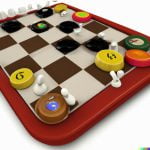Are you looking to dominate your opponents in the Civilization board game? Look no further than this comprehensive strategy guide that will provide you with all the tips and tricks you need to succeed. In this article, we will explore the key strategies and tactics necessary to master this beloved board game. Whether you’re a beginner or a seasoned player, this guide is sure to help elevate your gameplay.
The Civilization board game is a popular strategy game that challenges players to build their own empire from the ground up. From managing resources to conquering new territories, there are many factors to consider when developing your strategy. By understanding the rules and objectives of the game, as well as knowing how to best utilize different civilizations’ strengths and weaknesses, you can increase your chances of coming out victorious.
Strategy plays a crucial role in the success of any Civilization board game player. By carefully planning your every move and anticipating your opponents’ actions, you can gain a competitive edge on the playing field.
This guide will delve into the importance of strategy in this game and provide valuable insights on how to adapt your gameplay based on the current state of the game. Stay tuned for expert advice on maximizing your chances of winning and mastering the art of diplomacy and trade within the game.
Overview of Civilization Board Game Rules and Objectives
The Civilization board game, inspired by the popular video game series of the same name, is a complex and strategic game where players aim to build and lead their own civilization to victory. The game typically revolves around developing cities, managing resources, building wonders of the world, exploring technologies, engaging in warfare, and interacting with other civilizations through diplomacy and trade.
To begin playing Civilization board game, each player selects a civilization with its unique abilities and starts with a few starting units and resources. The main objective of the game is to accumulate Culture Points, which are earned through various achievements such as constructing buildings, completing objectives, winning battles, or researching technologies. The player who reaches a certain number of Culture Points first wins the game.
One important aspect of mastering the Civilization board game is understanding the rules and objectives thoroughly. It is crucial to plan your moves strategically to maximize your chances of success. By focusing on efficient resource management, clever expansion plans, wise technological advancements, and effective diplomacy with other players’ civilizations, you can gain an edge over your opponents. In the following sections, we will delve deeper into specific strategies and tips for excelling in this challenging yet rewarding game.
Importance of Strategy in Civilization Board Game
Understanding the Role of Strategy in Civilization Board Game
In the world of the Civilization board game, having a well-thought-out strategy is crucial to success. While luck may play a small role in the game, it is ultimately your strategic decisions that will determine whether you emerge victorious or fall behind.
A solid strategy can help you navigate the complexities of expanding your empire, managing resources effectively, and outmaneuvering your opponents. Without a clear strategy in place, you may find yourself struggling to keep up with more experienced players who have honed their tactics over time.
Developing an Effective Strategy
When developing a strategy for the Civilization board game, it’s important to consider several key factors. Firstly, determining your goals early on in the game can help guide your decisions and actions throughout the course of gameplay. Whether you aim to dominate through military conquest, achieve cultural supremacy, or win through scientific advancements, your overarching goal will shape how you approach each turn.
Another essential aspect of strategy is understanding the strengths and weaknesses of your chosen civilization. Each civilization in the game comes with its own unique abilities and advantages, which can be leveraged to gain an edge over your opponents. By capitalizing on these strengths while mitigating weaknesses, you can maximize your chances of success in the game. Additionally, adapting your strategy based on changing circumstances in the game can be critical to staying ahead of rival civilizations and securing victory.
Strategic Decision-Making in Diplomacy and Trade
Diplomacy and trade are integral components of the Civilization board game that require careful consideration when formulating your strategy. Making alliances with other players, negotiating deals for resources or territory, and establishing beneficial trade routes can all play a significant role in shaping the outcome of the game.
Understanding when to cooperate with others and when to pursue more aggressive tactics is key to navigating diplomatic relations successfully. By incorporating diplomacy and trade into your overall strategy effectively, you can increase your chances of forging alliances that work to your advantage while weakening your adversaries.
Key Factors to Consider When Developing a Civilization Board Game Strategy
When developing a strategy for the Civilization Board Game, there are several key factors that players must consider in order to increase their chances of success. Here are some important elements to keep in mind:
- Resource Management: Efficiently managing your resources is crucial in the Civilization Board Game. Whether it’s gold, food, production, or science points, balancing and prioritizing your resources can help you stay ahead of your opponents.
- Technology Research: Researching new technologies is essential for advancing your civilization and gaining an edge over other players. Be strategic in choosing which technologies to prioritize based on your current goals and objectives.
- Military Strength: Building a strong military presence can help you defend your civilization from attacks and conquer new territories. However, it’s important to strike a balance between military power and other aspects of your civilization to avoid neglecting key areas.
In addition to these factors, adapting your strategy based on the current state of the game is also crucial for success in the Civilization Board Game. Pay attention to your opponents’ actions, be flexible in adjusting your tactics, and always have a backup plan in case things don’t go as expected.
Remember that mastering the Civilization Board Game requires both strategic thinking and adaptability. By considering these key factors and continuously refining your gameplay through practice and experience, you can increase your chances of dominating your opponents and emerging victorious in this engaging strategy game.
Advanced Gameplay Tips and Tricks for Maximizing Your Chances of Winning
Once you have a good grasp of the rules and objectives of the Civilization board game, it’s time to focus on developing a winning strategy. One key factor to consider when strategizing in the game is your approach to expansion. It’s essential to balance the expansion of your empire with maintaining stability and resources. Rushing too quickly to expand without considering the consequences can leave you vulnerable to attacks from other players.
Another crucial aspect of maximizing your chances of winning in Civilization is managing your civilization’s resources efficiently. This includes not only strategic placement of cities and improvements but also optimizing trade routes and researching technologies that will benefit your overall development. Being resourceful and adaptable in how you utilize your available resources can give you a significant advantage over your opponents.
Additionally, one advanced gameplay tip for dominating in Civilization is understanding the strengths and weaknesses of different civilizations. Each civilization comes with its unique abilities and traits that can be leveraged to gain an edge during gameplay. By studying each civilization’s nuances, you can tailor your strategy accordingly and make informed decisions that align with your strengths while exploiting the weaknesses of others.
| Tip | Description |
|---|---|
| Balance Expansion | Expand strategically to avoid vulnerability |
| Efficient Resource Management | Optimize use of resources for maximum benefit |
| Understand Civilizations | Study unique strengths and weaknesses of each civilization for tailored strategies |
Analysis of Different Civilizations and Their Unique Strengths and Weaknesses
Civilization Board Game offers players the opportunity to choose from a variety of civilizations, each with its own unique strengths and weaknesses. When selecting a civilization to play, it’s essential to understand how their attributes can shape your overall strategy and gameplay experience. Some civilizations may excel in military conquest, while others may focus more on cultural development or scientific advancement.
One example of a powerful civilization in the game is the Romans. Known for their superior military capabilities, the Romans have a strong advantage when it comes to expanding their empire through conquest. Their unique ability allows them to build roads more efficiently, facilitating quicker movement of troops across the map. As a Roman player, focusing on aggressive expansion and military dominance can be a winning strategy.
On the other hand, civilizations like the Egyptians may prioritize cultural achievements and wonders over military conquest. With their ability to generate additional culture and utilize resources more effectively for building wonders, Egyptian players can focus on achieving cultural victories through advancements in art, architecture, and literature. This approach requires strategic planning to attract great people and complete wonders before other civilizations.
Each civilization in Civilization Board Game presents players with different challenges and opportunities that require careful consideration when developing your strategy. Understanding the unique strengths and weaknesses of your chosen civilization is crucial for maximizing your chances of success in the game. Whether you prefer military conquest, cultural domination, or scientific progress, adapting your strategy to leverage your civilization’s characteristics effectively is key to achieving victory.
| Civilization | Strengths | Weaknesses |
|---|---|---|
| Romans | Superior military capabilities; efficient road-building | Limited focus on cultural or scientific achievements |
| Egyptians | Strong cultural generation; effective resource management for wonders | Weaker in terms of military strength or expansion capabilities |
Strategies for Handling Diplomacy and Trade in Civilization Board Game
Diplomacy and trade are crucial aspects of the Civilization board game that can greatly impact your success during gameplay. By forming alliances, negotiating deals, and engaging in trade agreements, you can gain access to valuable resources, secure favorable positions on the game board, and even influence the actions of your opponents. Here are some key strategies for effectively handling diplomacy and trade in Civilization:
- Developing Strong Alliances: Forming alliances with other players can provide you with security, support, and valuable information throughout the game. Collaborate with like-minded civilizations to achieve common goals or team up against a more powerful opponent.
- Trade Agreements: Trade is essential for acquiring resources, technologies, and other advantages in Civilization. Establishing trade routes with other civilizations can help boost your economy and strengthen your position on the game board. Be strategic in your trading decisions to ensure that you benefit the most from each exchange.
- Diplomatic Tactics: Diplomacy plays a key role in influencing the actions of other players and shaping the course of the game. Use diplomatic tactics such as persuasion, coercion, or deception to advance your agenda and gain an edge over your rivals. Remember that maintaining good relations with others can also help prevent conflicts and promote cooperation.
In addition to forming alliances and engaging in trade agreements, it’s important to also consider how diplomacy and trade can be used to further your overall strategy in Civilization. Whether you’re aiming for cultural dominance, military conquest, or scientific advancement, leveraging diplomacy and trade effectively can help you achieve your objectives faster and more efficiently.
By mastering the art of handling diplomacy and trade in Civilization board game, you’ll be able to navigate complex political landscapes, forge beneficial partnerships, and outmaneuver your competitors with ease. Keep these strategies in mind as you chart your path to victory in the world of Civilization.
How to Adapt Your Strategy Based on the Current State of the Game
Adapting your strategy based on the current state of the game is crucial in the Civilization board game. As the game progresses, various factors such as your opponents’ actions, available resources, and technological advancements will impact your decision-making process. Here are some key considerations to keep in mind when adjusting your strategy:
Evaluating Your Position
One of the first steps in adapting your strategy is to evaluate your current position in the game. Take stock of your civilization’s progress in terms of development, military strength, and overall victory conditions. Are you leading in science and technology? Are your neighbors growing too powerful? Understanding where you stand will help you determine the most effective course of action moving forward.
Assessing Your Opponents
Another critical factor to consider is the actions and progress of your opponents. Keep a close eye on their civilization development, military expansion, and diplomatic relationships. Assessing their strengths and weaknesses will allow you to exploit opportunities and mitigate potential threats. Adjusting your strategy based on the behaviors of other players can give you a competitive edge in achieving victory.
Flexibility and Adaptability
In a dynamic game like Civilization, being flexible and adaptable is essential for success. Don’t be afraid to pivot from your initial plans or switch gears if necessary.
Whether it’s shifting focus from science to military production or altering trade routes based on changing circumstances, staying nimble with your strategy will increase your chances of coming out on top. Remember that no single approach guarantees victory, so being willing to adapt to the ever-changing landscape of the game is key to achieving success.
By continuously reassessing your position, evaluating opponents’ actions, and remaining flexible in your approach, you can effectively adapt your strategy based on the current state of play in the Civilization board game. Being proactive and strategic in adjusting to evolving situations will give you a competitive advantage and increase your chances of dominating your opponents on the path to victory.
Conclusion
In conclusion, mastering the Civilization Board Game requires a deep understanding of the game mechanics, careful planning, and strategic thinking. With the right approach, players can dominate their opponents and secure victory in this challenging and immersive game. By following the tips and tricks outlined in this strategy guide, players can enhance their gameplay experience and increase their chances of success.
One of the most important aspects of mastering the Civilization Board Game is adapting your strategy based on the current state of the game. Whether you are leading in cultural development or facing military threats from rival civilizations, being able to pivot your tactics accordingly is crucial for achieving victory. Flexibility and adaptability are key skills that can make a difference between triumph and defeat in this complex game of strategy.
Ultimately, success in the Civilization Board Game comes down to careful planning, calculated risk-taking, and skillful execution of strategies. By considering all the factors discussed in this guide, including civilization strengths and weaknesses, diplomatic relations, and economic management, players can position themselves as formidable contenders in every game they play.
So gather your resources, forge alliances, wage wars when necessary, and navigate through challenges with cunning – for only then will you emerge as a true master of the Civilization Board Game.
Frequently Asked Questions
What Is the Best Strategy for Civilization 6?
The best strategy for Civilization 6 involves balancing expansion, technological advancement, diplomacy, and military power. Players should focus on developing their cities efficiently, establishing trade routes, maintaining good relationships with other civilizations, and planning their military actions carefully.
Is Civilization a Strategy Game?
Civilization is indeed a strategy game at its core. Players must make decisions about resource management, city development, scientific research, warfare, and diplomacy in order to build a successful civilization and achieve victory. It requires strategic thinking and long-term planning to succeed.
How Long Does Civilization Board Game Last?
The duration of a game of the Civilization board game can vary depending on factors such as the number of players and their experience level with the game. Generally, an average game can last anywhere between 2 to 4 hours. Experienced players may finish faster while beginners might take longer to complete the game.

I love playing all kinds of games – from classics like Monopoly to modern favourites like Ticket to Ride.
I created this blog as a way to share my love of board games with others, and provide information on the latest releases and news in the industry.





